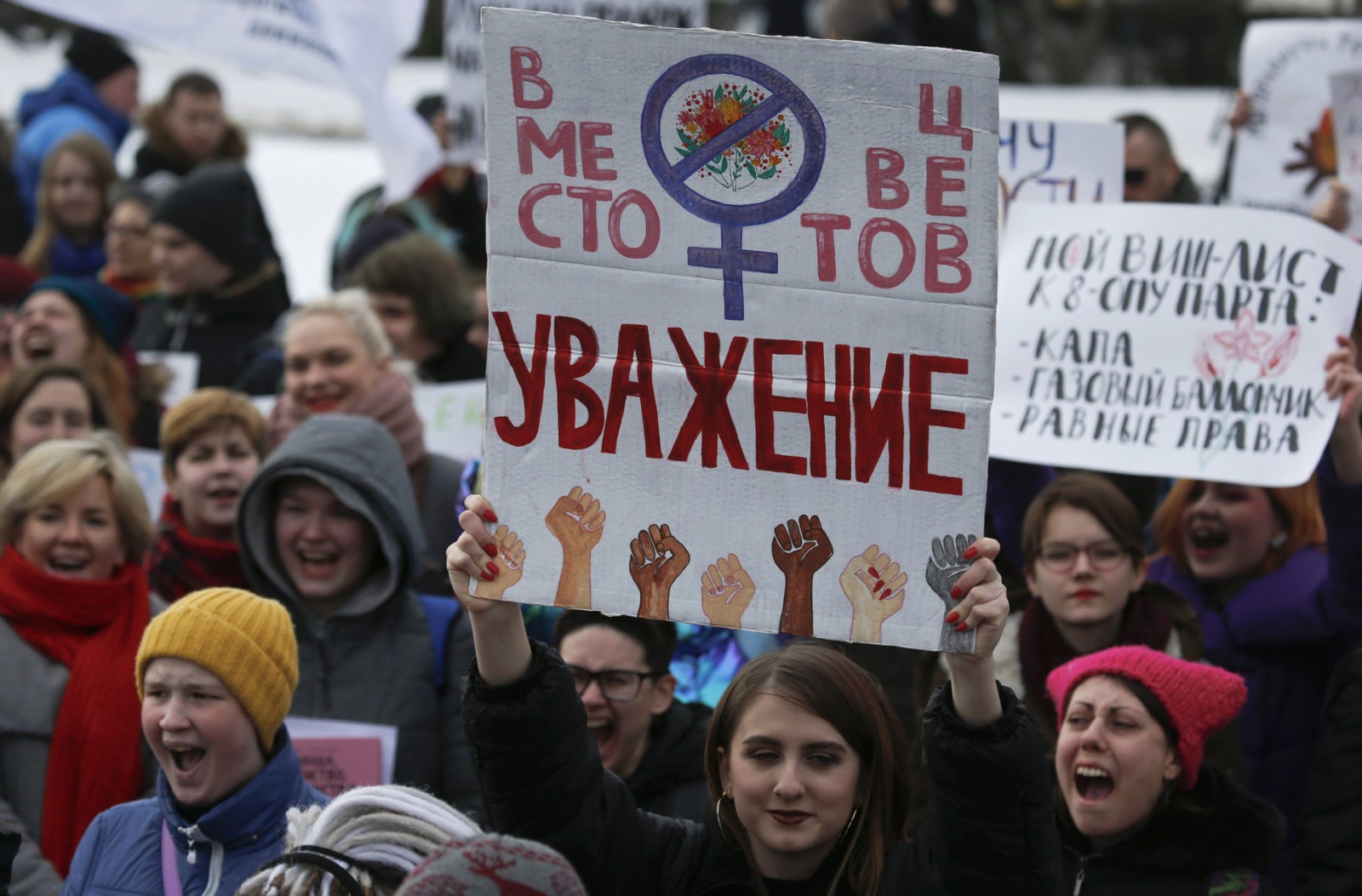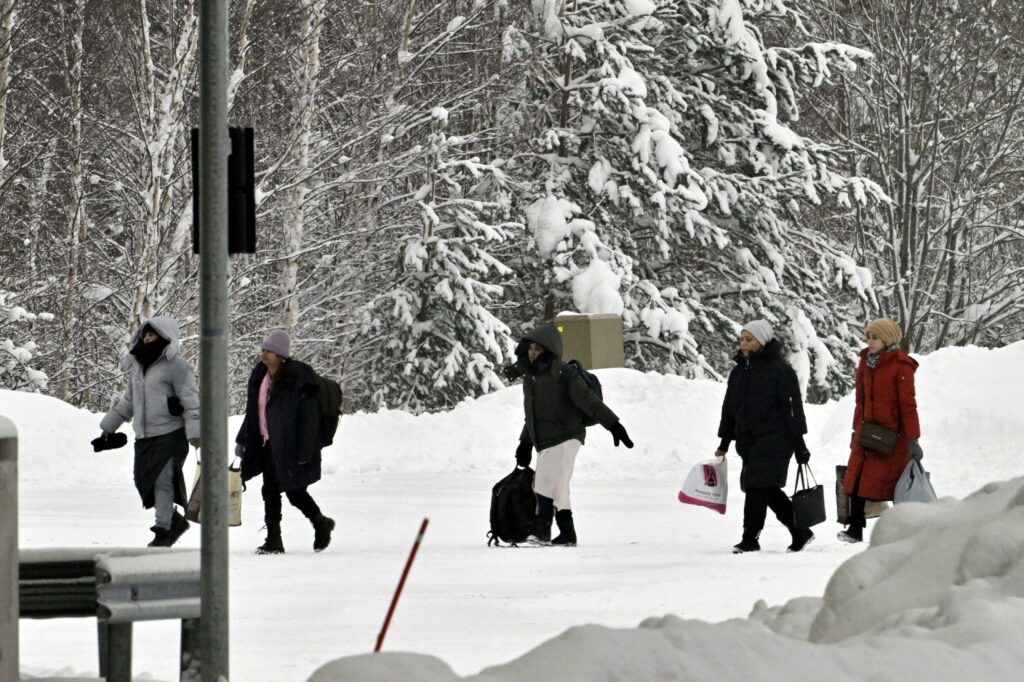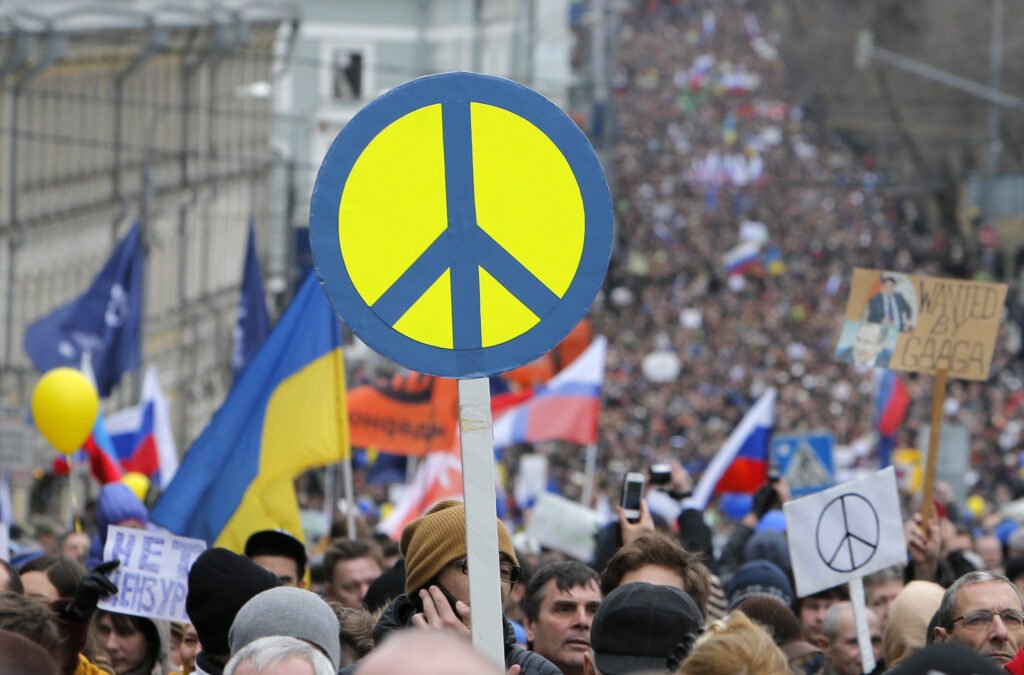International Women’s Day has come and gone. Like clockwork, every 8 March prompts familiar discussions about women’s rights, equality, and feminism. Last year saw intense public discussion about gender equality; the #MeToo campaign and harassment scandals in Hollywood also resonated widely over here, prompting much soul-searching about the nature of feminism and its role in Russian society.
Whatever their stance back then, nobody in Russia today really doubts that gender relations are changing significantly. What is more difficult to establish with any certainty is the direction of these changes: is Russian society moving towards greater gender equality, or will the future bring a newly strengthened patriarchy instead?
It’s a confusing picture. On the one hand, new forms of intimacy are emerging: sexual pleasure is now widely accepted as something meaningful for both men and women. We have also entered an era in which blatant gender discrimination is seen as unacceptable, if not indecent. On the other hand, there has been a palpable conservative backlash to these changes, accompanied by a turn towards neo-traditionalism. And while the principle of gender equality in Russia is not widely disputed, women’s main contribution to the public good is still widely understood to be giving birth to children and being responsible for their upbringing. This trend has manifested itself in renewed proposals to remove abortion from the public healthcare system and introduce pro-natalist measures (such as extra financial support for pregnant mothers.)
The roots of the fraught and often contradictory state of gender relations in Russia today can be found in their no less contradictory past. Russia’s great asset here is its legacy from the early Soviet years, during which radical policies were introduced in support of reproductive rights (for example, the legalisation of medical abortion in 1920), alongside the political mobilisation of women and their entry into the workplace alongside men for equal pay. Yet these gains were disrupted by the «great retreat» of the 1930s and 1950s, when women’s economic mobilisation became increasingly tied to the promotion of their traditional maternal role. The figure of the working mother then came to dominate the late Soviet years; a woman who was still obliged to play her traditional role and perform domestic labour alongside the demands of her professional life. After the collapse of the Soviet Union, the state receded from the social sphere throughout the 1990s; by the mid-2000s, it had returned and declared the promotion of motherhood to be one of its key priorities.
By the late 2010s, the country’s authorities started to revive traditional gender roles and aggressively fought off any attempts to revise them. In hindsight, statements by leading Russian politicians and legislative initiatives during these years strongly suggest that the latter triumphed in this clash between liberals and neo-traditionalists over gender. The results of the World Bank’s Women, Business, and the Law survey for 2019 give the same picture: Russia falls below the middle in the overall ranking of countries, lagging behind all other post-Soviet states except for Uzbekistan.
With that in mind, perhaps it’s time to ask how conservative we really are. To what extent does Russia’s official stance towards gender and its international rankings when it comes to gender equality really reflect ordinary citizens’ perceptions about the role of men and women in society?
Traditional Values in the Bedroom and the Workplace
The gender order is not monolithic. It is more accurately described as a changeable mosaic of several different pictures, representing different dimensions of gender equality, such as labour relations (including unpaid domestic work), political power relations, and emotional relationships. While all these dimensions are interrelated, gender relations, practices, and attitudes can transform in one of these areas relatively independently from others. Being aware of these changes requires not zooming out and making generalisations, but instead assessing the potential for change in each of these field. How have Russians’ views on gender equality and the family changed? What about their views of gender roles in the labour market? Has our perception of these areas become more or less «traditional?»
The data give a surprising picture. Contrary to expectations, over the past six years, Russians’ views on gender issues have either not changed at all or have completely «retreated» in favour of traditionalism. We compared respondents’ answers in the 2011 and 2017 World Values Survey and discovered some interesting dynamics. For instance, over those six years, the share of those who believe that it is problematic for a woman to earn more than a man increased from 23% to 34.5%. The share of those who believe that children’s wellbeing will suffer if their mother is employed remains about the same (38.8% win 2011 as compared to 36.8% in 2017.) The share of those who consider a university education less important for girls than for boys increased from 22.6% to 26.7%.
Views appear to have liberalised when it comes to intimate relationships. Russians’ attitudes to premarital sex have grown somewhat more tolerant. If in 2011, 13% of respondents considered premarital sex to be completely unacceptable, by 2017 the figure had fallen to 11%. Figure 1 shows this gradual shift towards liberal attitudes, which is partly a predictable consequence of a move towards modernity. Despite a small fall in their numbers, the overwhelming majority of respondents consider domestic violence against women to be unacceptable: 78% in 2011 and 72% in 2017.
However, this liberalisation of sexual mores has not necessarily led to more equality in intimate relationships. It is important to remember that freer sexual behaviour can easily coexist with the objectification of the female body, hierarchical relationships, and the moral requirements which are still closely linked to sex for many people. As research shows, the «sexual revolution» has not always played into the hands of women. For example, although the right to pleasure for both partners is now widely recognised, contraception and family planning are still primarily responsibilities for women.
Figure 1. Attitude to premarital sex: 2011 vs 2017
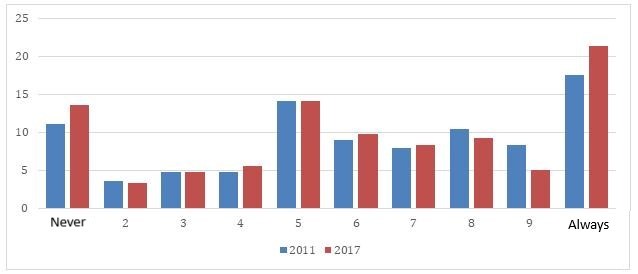
Question: Now I’m going to read out some different statements. Please tell me to what degree you believe each one to be justifiable, rating them on a scale of one to ten (where one means «can never be justified» and ten means «can always be justified.» Statement one: Premarital sex.) Source: WVS.
Even if freer relationships and emancipation of women in the private sphere tend to go hand in hand, that situation usually only lasts until childbirth. Upon becoming mothers, modern Russian women become subject to the traditional, gendered division of roles and responsibilities, whether they like it or not. The problem of striking a balance between work and childcare is much more acute for them than for men. By providing direct financial support to parents, rather than developing institutions that equally support family and professional life (such as improved quality of and access to kindergartens or flexible forms of employment for parents), the government contributes to the reproduction of traditional gender relations, thereby distancing women from paid employment.
Meanwhile, some worrying changes can be observed in labour relations. By the end of 2017 there was a significant increase in the share of those who believe that men should be given priority access to employment when jobs are scarce. The figure rose from 28% in 2011 to 40% in 2017 (see Figure 2.) The 12% jump is likely to be the result not only of economic recession (such downturns are often accompanied by resurgent nationalism and conservative attitudes towards gender) but to a longer-term trend towards traditionalism by the Russian state and, most likely, from part of Russian society.
Given that this rise coincides with a growth in negative attitudes towards income equality between married couples, we can only assume that the answers reflect not only fear of job losses, but more fundamental concerns about social status. They could also testify to the success of state-promoted conservative ideology, with its traditional outlook on gender relations where the family breadwinner is always assumed to be male.
Figure 2. Changing attitudes to various aspects of gender equality: 2011 vs 2017.

At the same time, attitudes towards domestic work have changed significantly. If in 2011, household work was seen by 83% as just as worthy as any other form of work, then in 2017 this figure had decreased to 53.3%. We might remember Vladimir Putin’s words during the launch of the maternity capital programme in 2006, when he justified the introduction of new forms of social support by invoking the image of the housewife who, having given birth to two children, has fallen behind in her career path and is inevitably vulnerable as a result. Yet survey data reveal that the rhetoric behind many of these pro-natalist policies has not been too convincing; domestic work and caring for children are still widely perceived as female responsibilities (responsibilities whose status has not increased in the eyes of the population, but has in fact significantly decreased.)
Women and Power
The public sphere can be a forbidding place for women even in fairly developed societies. Perhaps nowhere is this truer than in political life, riddled as it is with gender inequality. After all, power under the patriarchal order is associated with men, and women are consigned to a subordinate role. More than half (57%) of Russians believe that men make preferable political leaders; a figure which did not change between 2011 and 2017. Attitudes towards women occupying leadership positions in business have also deteriorated: in 2011, 48% felt that men made better business leaders, a figure which rose to 53% by 2017. At the same time, 67% of most Russians do not consider there to be any obstacles to women’s political participation.
However, it is a known fact that the formal representation of women is just as good in authoritarian states like Cuba or Rwanda. This phenomenon is called «descriptive representation,» meaning that while there may be formal representational diversity in some political bodies, women are unlikely to be found in those parts of government where the real decision-making powers are concentrated. An unusually high number of women in the parliaments of authoritarian states should not confuse anybody; legislatures are far from the most prestigious bodies in such countries, and places in them are usually not distributed according to meritocracy, but instead based on patronage and loyalty networks. Female lawmakers usually end up in parliaments like these thanks to the patronage of influential men of higher status, not as a result of their own merits.
Does Privilege Mean Progress?
If the gender order varies, then so do we, people who experience gender relations in our daily lives and share certain attitudes towards them. As Figures 3 and 4 show, respondents with a higher income and social status are inclined towards more progressive views on gender equality. Generally speaking, this is in keeping with global trends. Those from privileged groups often act as trailblazers; they are the first to pick up on new trends and implement them in everyday life. Meanwhile, there is no obvious difference between middle and working class respondents, a dynamic which somewhat sets Russia apart from EU member states.
Figure 3. Averages of those who believe that men make better business leaders and political leaders (averages from 0 to 4 on Y axis, social status on X axis)
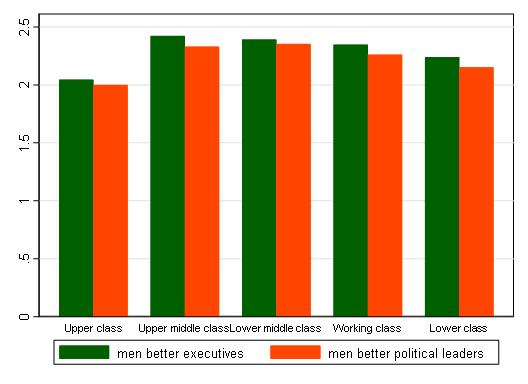
Source: World Values Survey 2017]
Figure 4: Averages of those who believe that men should be given priority access to employment when jobs are scarce, sorted by social status (on X axis)
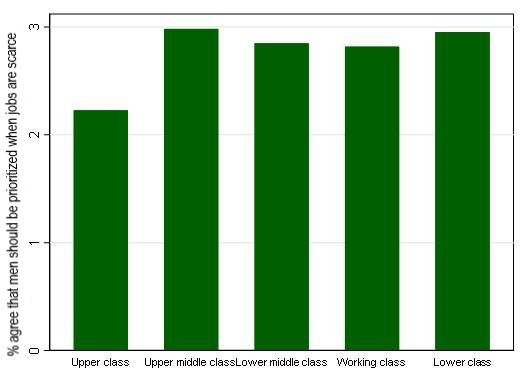
Unsurprisingly, it seems that belonging to the privileged sex also colours citizens’ views. To return to politics, we can safely say that some female respondents are even more conservative than male ones (see Figure 5.) The averages of those who consider men to be superior business and political leaders are about 0.3 points higher among women on a four point scale. However, women are less likely to agree that men should be prioritised when it comes to employment. Finally, the same proportion of both female and male respondents consider women receiving higher salaries than men to be problematic.
Figure 5. Averages for attitudes towards various aspects of gender relations, comparing men to women.

Source: World Values Survey 2017
Poor Prospects
In this article we have tried to consider the Russian gender order not from the perspective of the state, which usually takes centre stage in studies of this topic, but instead from the viewpoint of ordinary citizens. This has led us to pose a number of questions. If neo-traditionalism really is the order of the day in the state’s gender policy, does this mean that the population also shares such values? How consistent and uniform are citizens’ views really? Can it be said that Russians are more open to modernisation in some aspects of gender relations than others? Finally, can different social groups (for example, by class or gender) be distinguished by their more or less progressive attitudes towards gender?
In considering these questions (and taking into account the survey data), we are forced to draw some disappointing conclusions. Russian citizens’ judgements on a whole range of scenarios, from the mode of production and roles in the family to broader power relations, show that they clearly and consistently express neo-traditional attitudes towards gender. Our comparison of the data from 2011 and 2017 demonstrates that these attitudes have only strengthened with time. Domestic labour is appreciated less than before, while a significant share of the population sees paid employment as a predominantly male domain and believes that in case of job scarcity, men should be given priority in hiring.
Nevertheless, views of intimate relationships appear to have liberalised, although the data available do not allow us to conclusively establish how or whether this trend is linked to advancements in gender equality in the same field. Moreover, it would be controversial to speak of liberalising attitudes to sexuality in Russia today in the context of legislation which actively discriminates against non-heterosexuals. This is clearly an issue which merits much more comprehensive study.
Given the multi-faceted nature of gender relations, it is hard to formulate any general conclusions about their transformation. The categories with which we operate, and which are used in conducting surveys and building indices, are ambiguous. This leads us to assess gender equality, for the most part, by measuring levels of equality between men and women. Methods of measurement like these are simply unable to factor other gender inequalities which occur at the intersection of other categories, such as age, class, sex, or sexuality. As such, some more subtle distinctions still remain invisible to researchers. However, even taking into account all these obstacles, we can conclude that our outlook for gender relations is far removed from those of Clara Zetkin and Rosa Luxemburg. If things will change, it will be in a much more conservative manner.
